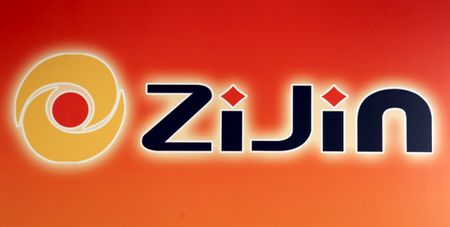By Siyi Liu and Dominique Patton
BEIJING (Reuters) – The head of China’s Zijin Mining Group Co Ltd said lithium prices now at record levels could halve by end-2025, telling the Reuters NEXT conference however the miner would still forge ahead with heavy investment in the sector.
The company, China’s top gold extractor and a leading producer of copper, has already spent $16 billion buying three lithium mines over the past year, making it one of the world’s top 10 producers of the battery metal. The flurry of deals comes even as warnings emerge that lithium prices, driven to records by rapid growth in electric vehicles, may peak next year because of a looming supply glut.
“Zijin aims to become one of the top three to five mining companies in the world by 2030. To do that, we need a new growth driver on top of our gold, copper and zinc sectors,” said company president Zou Laichang.
“New energy and new materials are the key strategic path for us to achieve this goal.”
Zijin’s recent purchases include Canada’s Neo Lithium Corp, a company focused on lithium mining in Argentina, bought for C$920 million ($690 million) in a deal completed in January and giving it access to the Tres Quebradas (3Q) project.
It also bought majority stakes in the Lakkor Tso Lithium Salar mine in China’s Tibet region and the Xiangyuan lithium mine in Hunan province.
Zou said more investments are planned, giving no details on how much the company was planning to spend. Zijin has a market capitalisation of about $35 billion and net profit of 15.7 billion yuan ($2.2 billion) last year.
But competition for resources is fierce, with companies such as Chinese battery maker Contemporary Amperex Technology Co Ltd (CATL) and automakers BYD and Tesla also seeking access to lithium.
Some firms are also working to develop alternative battery materials, which could reduce lithium demand in the long term.
“Of course there are concerns … but we will take full advantage of our technology and cost advantage to remain competitive,” Zou said.
“We’ve been working on our lithium extraction from salt lake brine and hard-rock deposits to bring down cost and improve utilisation rate efficiency,” he said.
A surge in supply coming onstream by 2025 is expected to push prices down to a “normal range” of 300,000 yuan to 400,000 yuan a tonne in the second half of that year, Zou said.
That would cut as much as half from China’s current spot lithium carbonate battery grade prices, which according to Fastmarkets sit at a record 597,500 yuan ($83,430) a tonne, about three times higher than they were a year ago.
China accounts for about 60% of world lithium chemical supply and its prices are an important global benchmark. Zijin told investors recently it made its mine acquisitions based on lithium carbonate prices of 100,000 yuan a tonne.
There are growing headwinds for Chinese miners seeking to invest overseas, however. Last month, Canada ordered three Chinese companies to give up investments in lithium mines there, citing national security.
“We will be more careful, focusing more on assessing policy and political risks,” Zou said.
Zijin is also in a legal dispute with Australian miner AVZ Minerals Ltd over the purchase of a 15% stake in the Democratic Republic of Congo’s Manono project, thought to be one of the world’s largest lithium mines.
Zijin is aiming to have 150,000 tonnes of lithium carbonate equivalent (LCE) capacity by 2025, according to an investor briefing on Nov.15.
That’s about half the capacity planned by major Chinese producer Ganfeng Lithium Co. Ltd..
Zijin is also expanding downstream and starting lithium iron phosphate (LFP) production. Zou said about 20,000 tonnes of LFP capacity would be launched by the end of this year.
To view the Reuters NEXT conference live on Nov. 30 and Dec. 1, please click here.
($1 = 1.3379 Canadian dollars)
($1 = 7.1462 yuan)
(Reporting by Siyi Liu and Dominique Patton in Beijing; Additional reporting by Gao Zhuo in Hong Kong; Editing by Tom Hogue)

